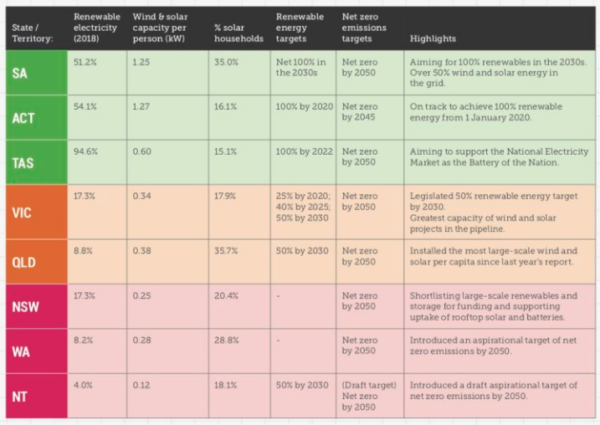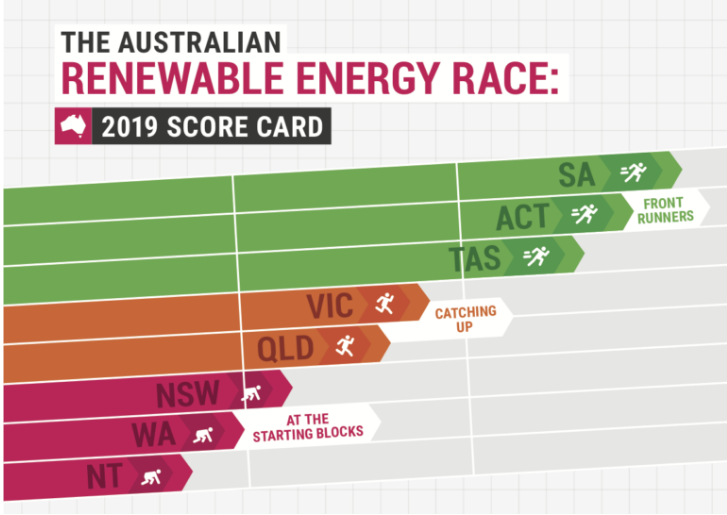A new report from the Climate Council has found the Federal Government is not only failing to lead on the transition to renewable energy but also obstructing the rollout of renewable energy at a state and territory level. With no plans to replace the Renewable Energy Target (RET) “with anything“ when it expires in 2020 and following the last year’s failed attempt at national energy policy – the National Energy Guarantee, the Federal Government has displayed “reckless lack of leadership on climate change” and shifted all responsibility onto states and territories.
The climate policy inertia on the federal level has already undermined investor confidence in Australia, resulting in a reduction of over 60% from 2018 levels. According to the Clean Energy Council, new clean energy investment has slowed significantly, with average quarterly investment in new generation capacity this year just over 500 MW per quarter compared to over 1600 MW per quarter in 2018.
“The Federal Government has gone out of its way to attack states that are working to increase the uptake of renewable energy,” said energy expert and Climate Councillor Greg Bourne. “The lack of effective national energy policy has undermined investor confidence in renewable energy. New renewable supply is the best way to get down electricity prices and emissions. Without a consistent and stable policy environment the Federal government is undermining the future pipeline of Australian projects.”
The big race
Despite the policy void on the federal level, action on the state and territorial level has been vigorous with South Australia leading the charge. According to the report State of Play: Renewable Energy Leaders and Losers, the Australian Capital Territory and Tasmania are hot on its heals. Namely, the trio is “way ahead” of the other states and territories across a range of renewable energy metrics, which include share of electricity from renewable energy; proportion of households with rooftop solar; large-scale wind and solar capacity per capita; and targets or policies in place to support the transition.
“States and territories are driving the transition to a renewable energy future, in the face of the Federal Government’s lack of leadership. As a result, several states and territories have declared the intention to go it alone on renewable energy policy,” said Bourne. “It is time for all states and territories to create their own forums for coordination and move on without the Federal Government.”
South Australia, the nation’s traditional renewable energy leader, has welcomed the report and in particular, the Climate Council’s determination that the state is a global leader in the energy transition. Indeed, very few grids in the world have decarbonized as rapidly as South Australia. The state’s emissions intensity has fallen from over 700 kg/MWh in 2008 to less than half that in 2018 and the state now generates over half of its electricity from wind and solar, as it aims for its 2030 target of “net” 100% renewables.
“The Marshall Government’s $200 million Home Battery Scheme, $50 million Grid Scale Storage fund and $30 million Demand Management trials are driving our transition to more affordable and reliable clean power,” Minister for Energy Dan van Holst Pellekaan said welcoming the report. “The SA/NSW interconnector is another vital component of our energy plan and will provide a freeway to the eastern seaboard for our abundant renewable energy, creating jobs and investment in South Australia.”

In other highlights, the Climate Council notes that the ACT is on track to achieve 100% renewable energy and become just the eighth jurisdiction in the world with a population above 100,000 – and the only one outside of Europe – to achieve 100% renewable electricity, while Tasmania’s Battery of the Nation plan could double the state’s renewable energy capacity and generate local jobs and billions of dollars in investment.
“Victoria and Queensland are making good progress on the transition to renewable energy, but will need to work hard to catch the frontrunners,” the report states. Victoria has won the ‘Rising Star Award’ for having the most substantial capacity of large-scale wind and solar projects in the pipeline of any state or territory, while Queensland has claimed the ‘Most Improved Award’ for eclipsing the other states and territories in terms of increased large-scale wind and solar capacity per person from last year’s report. “Nearly half of the large-scale renewable energy projects completed across Australia in 2018 were in Queensland,” the report says.
Still behind
Despite progress, Queensland is not on track to meet its target of 50% renewable energy by 2030, while its government continues to support new fossil fuel developments in the state, the Climate Council notes. This echoes the findings from the Green Energy Markets (GEM) released in July, shiowing that New South Wales and Queensland are lagging far behind their renewable energy commitments, while Victoria, South Australia and Tasmania are on track to meet their climate goals.
According to the Climate Council scorecard, NSW and Western Australia rank low as the only states without a renewable energy target, while the Northern Territory ranks last or near the bottom on most other metrics. “The Northern Territory wins the Wooden Spoon for finishing last in this year’s renewables race, as it has in every scorecard to date. However, recent signals from the NT government are encouraging,” the report states.
The NT recently announced a draft aspirational target for net-zero emissions by 2050, making it the last state or territory to release a net-zero target. “While this is an important step in the right direction, the draft plan includes expansion of the Territory’s gas industry, which is incompatible with emissions reduction,” the report notes.
This content is protected by copyright and may not be reused. If you want to cooperate with us and would like to reuse some of our content, please contact: editors@pv-magazine.com.









By submitting this form you agree to pv magazine using your data for the purposes of publishing your comment.
Your personal data will only be disclosed or otherwise transmitted to third parties for the purposes of spam filtering or if this is necessary for technical maintenance of the website. Any other transfer to third parties will not take place unless this is justified on the basis of applicable data protection regulations or if pv magazine is legally obliged to do so.
You may revoke this consent at any time with effect for the future, in which case your personal data will be deleted immediately. Otherwise, your data will be deleted if pv magazine has processed your request or the purpose of data storage is fulfilled.
Further information on data privacy can be found in our Data Protection Policy.